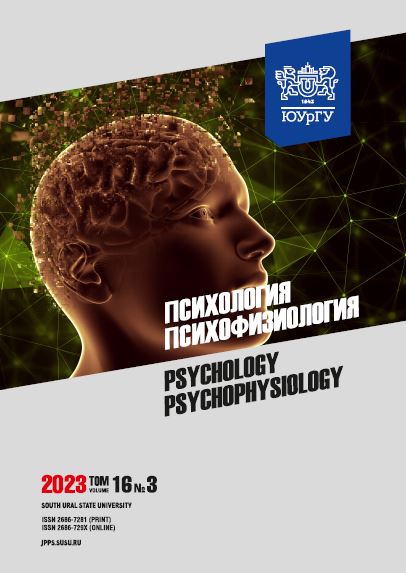Adaptation phenomenon. Theoretical review
Abstract
Background. The need to adapt in a constantly changing society puts the problem of personality adaptation on a high priority list. Regardless of its relevance for psychological science, this problem still requires further investigation. There is no universal definition for the subject, structure, or components of the concept. Different scholars have contradictory views on the nature of personality adaptation. Aim. This paper presents a theoretical analysis of the existing approaches that define the subject, components, and structure of adaptation. The secondary aim was to identify the factors that influence adaptation. Results. The article presents an analysis of existing ideas about adaptation within complementary disciplines and psychological science and provides different viewpoints on the idea in general. The contents of the psychological, psychophysiological, and behavioral components of adaptation are given. The article describes psychological, pedagogical, social, and sociopsychological types of adaptation. The characteristics of adaptation are provided, as described by scholars. Conclusion. Adaptation is considered a structurally complex, integral, multi-component notion. Adaptation can be classified with respect to its type (psychological, social, sociopsychological, and pedagogical) and component (psychological, behavioral, physiological). Adaptation is a continuous process that results from constant environmental changes. The data obtained provides a systematic review and a solid theoretical base for further investigation of personality adaptation. A systematic view of the problem of psychological adaptation contributes to existing knowledge about its structure, components, and characteristics.
Downloads
References
2. Durkheim E. Value Judgments and Judgments of Reality. Sotsiologicheskie issledovaniya = Sociological Research. 2011;2:46–54. (in Russ.).
3. Grimak L.P. Psikhologiya aktivnosti cheloveka. Psikhologicheskie mekhanizmy i priemy samoregulyatsii [Human Activity Psychology. Psychological Mechanisms and Methods of Self-Control]. Moscow, Librokom. 2010:368. (in Russ.).
4. Torndaik E., Uotson D.B. Bikheviorizm [Behaviorism]. Moscow, AST-LTD. 1998:704. (in Russ.).
5. Merton R., Mid G., Parsons T. Amerikanskaya sotsiologicheskaya mysl [American Sociological Review]. Moscow, MGU Publishing. 2010:32–40. (in Russ.).
6. Khorni K. Samoanaliz [Self-Analysis]. St. Petersburg, Piter. 2022:272. (in Russ.).
7. Adler A. Ponyat prirodu cheloveka [Understanding Humain Nature]. Saint Petersburg, Publ. Akademicheskii proekt. 1997:150. (in Russ.).
8. Ellis A. Gumanisticheskaya psikhoterapiya: Ratsionalno-emotsionalnyi podkhod [Humanistic Psychotherapy]. St. Petersburg, EKSMO-press. 2002:269. (in Russ.).
9. Lazarus R.S. Emotion and adaptation. New York, Oxford: Oxford University Press. 1991:471–519.
10. Frankl V. Mans Search for Meaning. An Introduction to Logotherapy Boston, Beacon Press. 2006:77.
11. Levin K. Dinamicheskaya psikhologiya. [Dynamic Theory of Personality]. Moscow, Smysl. 2001:312. (in Russ.).
12. Rodzhers K.R. Klientotsentrirovannaya psikhoterapiya [Client-Centered Therapy]. Moscow, Refl-buk. 1997:318. (in Russ.).
13. Maslow A.G. Motivatsiya i lichnost [Motivation and Personality]. St. Petersburg, Evraziya. 1999:213. (in Russ.).
14. Festinger L. Vvedenie v teoriyu dissonansa. Teoriya kognitivnogo dissonansa [Theory of Cognitive Dissonance: Introduction. Theory of Cognitive Dissonance]. St. Petersburg, Yuventa. 1999:15–52. (in Russ.).
15. Immigrant youth in cultural transition: Acculturation, identity and adaptation across national contexts / J.W. Berry, J.S. Phinney, D.L. Sam, P. Vedder (Eds.). 2006. Lawrence Erlbaum Associates Publishers. DOI: https://doi.org/10.4324/9780415963619
16. Anokhin P.K. Izbrannye trudy. Filosofskie aspekty teorii funktsionalnoi sistemy P.K. Anokhin [Selectas. Philosophical Aspects of Functional System Theory P.K. Anokhin]. Moscow, Publ. Prosveshchenie. 2007:318. (in Russ.).
17. Rean A.A., Kudashev A.R., Baranov A.A. Psikhologiya adaptatsii lichnosti [Personality Adaptation Psychology]. Moscow, Praim-EVROZNAK. 2006:480. (in Russ.).
18. Nalchadzhyan A.A. Lichnost: gruppovaya sotsializatsiya i psikhicheskaya adaptatsiya [Personality: Group Socialization and Psychological]. Erevan, AN ArmSSR. 1988:284. (in Russ.).
19. Klyuchnikova L.V., Poznyakov V.P. Sotsialno-psikhologicheskie faktory adaptatsii pereselentsev k novym sotsialno-ekonomicheskim i etnokulturnym usloviyam (na primere nemtsev, vyekhavshikh iz stran SNG v Germaniyu) [Socio-psychological factors of adaptation of migrants to new socio-economic and ethno-cultural conditions (on the example of Germans who left the CIS countries for Germany)]. Sotsialno-psikhologicheskie issledovaniya rukovodstva i predprinimatelstva [Socio-psychological studies of leadership and entrepreneurship]. Eds.: A.L. Zhuravlev, E.V. Shorokhova. Moscow: Ed.-in “Institute of Psychology of the Russian Academy of Sciences”. 1999:203–217. (in Russ.).
20. Aksenova G.I., Aksenova P.Yu. The problem of personality adaptation in Russian psychology. Prikladnaya yuridicheskaya psikhologiya = Applied legal psychology. 2012;4:28–36. (in Russ.).
21. Zotova O.I., Kryazheva I.K. Nekotorye aspekty sotsialno-psikhologicheskoi adaptatsii lichnosti v proizvodstvennom kollektive [Some aspects of sociopsychological personality adaptation in working collective]. Psikhologicheksie mekhanizmy regulyatsii sotsialnogo povedeniya [Psychological mechanisms of social behavior regulation]. Moscow, Nauka. 1979:219–232. (in Russ.).
22. Aleksandrovskii Yu.A. Sostoyaniya psikhicheskoi dezadaptatsii i ikh kompensatsiya [States of Psychological Maladjustment and Their Compensation]. Moscow, Nauka. 1976:272. (in Russ.).
23. Petrovskii V.A. Psikhologiya neadaptivnoi aktivnosti [Non-adaptive Activity Psychology]. Moscow, TOO “Gorbunok”. 1992:224. (in Russ.).
24. Korovnikova N.A. Features of socio-economic adaptation of modern Russians. Ekonomicheskie i sotsialnye problemy Rossii = Economic and social problems of Russia. 2019;1:8–29. (in Russ.).
25. Slobodchikov V.I. Ocherki psikhologii obrazovaniya [Essays on Education Psychology]. Birobidzhan, BGPI Publishing. 2005:270. (in Russ.).
26. Du Toit S.J., Kruger N. The Child: An Educational Perspective. Durban: Butterworths, 2014:476.
27. Simonova G.I. Pedagogical support of social adaptation of students: component composition. Scientific publishing company of Vyatka State University = Vestnik Vyatskogo gosudarstvennogo universiteta. 2008;1(4):101–106. (in Russ.).
28. Berezin F.B., Barlas T.V. Sociopsychological adaptation with Neurotic and Psychosomatic Disorders. Zhurnal nevropatologii i psikhiatrii im. S.S. Korsakova = The Korsakovs Journal of Neurology and Psychiatry. 1994;94(6):38. (in Russ.).
29. Berezin F.B. Psikhicheskaya i psikhofiziologicheskaya adaptatsiya cheloveka [Psychical and Psychophysiological Adaptation of Human]. Leningrad, 1988:270. (in Russ.).
30. Barabanova E.I., Shchetinina E.V. Human Population Sociopsychological Adaptation Problems in Modern Society. Vestnik Kazakhstansko-Amerikanskogo svobodnogo universiteta = Bulletin of the Kazakh-American Free University. 2005;4:13–19. (in Russ.).
31. Baevskii P.M. The Concept of physiological norm and helth criteria. Rossiiskii fiziologicheskii zhurnal = Russian Physiological Journal. 2003;4:473–487. (in Russ.).
32. Litvinova N.A., Kazin E.M., Lure S.B., Bulatova O.V. Individual Psychophysiological Adaptation Particularities Role in Mental Activity. Vestnik Kemerovskogo gosudarstvennogo universiteta = Bulletin of Kemerovo state university. 2011;1:141–147. (in Russ.).
33. Ananev B.G. Chelovek kak predmet poznaniya [Human as an Object of Cognition]. St. Petersburg, Piter. 2001:288. (in Russ.).
34. Agadzhanyan H.A. Zdorove studentov [Students health]. Moscow, RUDN. 1997:199. (in Russ.).
35. Khvatova M.V. Functional condition of a person as integral characteristic. Vestnik Tam-bovskogo universiteta. Seriya: Gumanitarnye nauki = Tambov University Review. Series: Humanities. 2008;3(59):22–27. (in Russ.).
References on translit
-Copyright (c) 2023 Psychology. Psychophysiology

This work is licensed under a Creative Commons Attribution-NonCommercial-NoDerivatives 4.0 International License.



